A highly-functional software is like magic when it works. But we’ll be the first ones to admit that developing it isn’t a walk in the park. With so many development options available, businesses must decide which is better, and that has led to the debate of in-house development vs outsourcing.
Satya Nadela said, “all companies are software companies”. As the CEO of Microsoft, it’s safe to assume that he knows much about software development.
But when it comes to developing high-quality and reliable software, the question is do you go for in-house development or outsource it? The decision can be pretty tough. While outsourcing may make sense for one company, it might not be suitable for another.
Understanding the fundamental differences between the two development approaches, as well as the pros and cons of each, will help you decide which is best for your company.
That’s exactly what this guide is all about. We’re going to give you a complete in-depth explanation of both methodologies for software development. By the end, you can make the right decision about whether it makes more sense to go in-house or outsource your development.
What Is In-House Development?
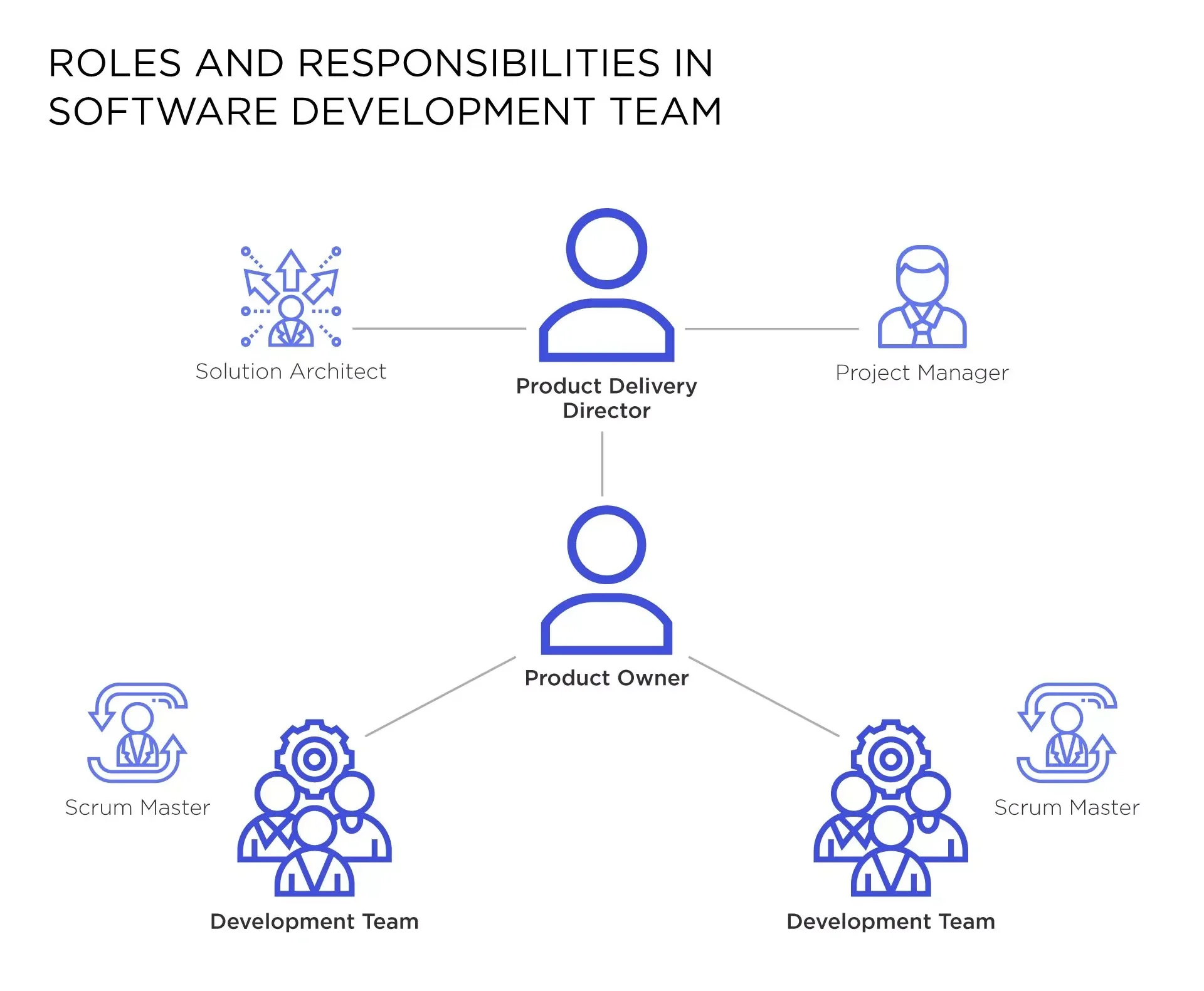
Let’s start by understanding what in-house development is. Honestly, it’s exactly what it sounds like. In in-house development, the team of experts you have on staff will be building software for you. All the work is handled by your employees without any external help.
In in-house development, you build your team from scratch and everything from choosing the right people with the right skill set falls on you. You’ll be in charge of hiring and managing the workforce.
Now in-house doesn’t always necessarily mean hiring new people. You might already have the expertise on board. If you use them to work on a project, that’ll be considered in-house development too.
For in-house development to produce the desired results, selecting the right team is vital. The team can consist of many types of people. Designers who can help shape your idea; software wizards that know the ins and outs of your project and its needs; a project manager with top-notch people skills and project management know-how that ensures the work gets done.
At the end of the day, if you do it right, you’ll have a tech dream team that you can trust working on your side toward the vision of the company.
To make an informed decision of whether to opt for in-house development or not, you should know the advantages and disadvantages of it. Let’s check them out.
Pros Of In-House Development
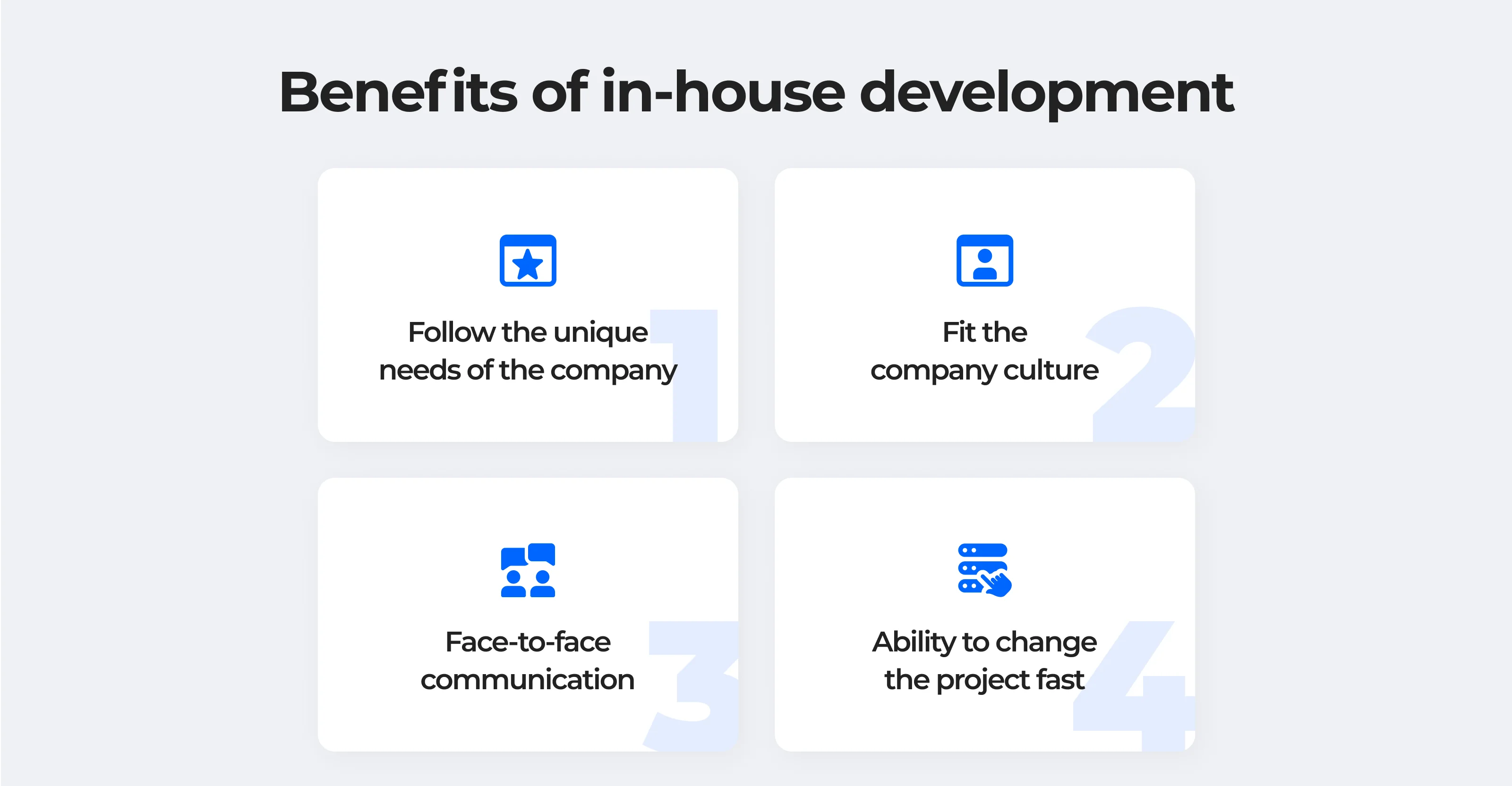
Going the in-house route comes with its own set of pros and cons. Let's go over them in more detail, starting with the pros.
I. Complete Control
The biggest pro of having an in-house development team is complete control. Since your in-house team members are on your payroll, you can use the workforce efficiently. They can be taught the exact technologies you need as well as your company's culture and software philosophies. And by having them employed long-term, they’ll also inherently know what the business requirements and company’s vision are.
II. Efficient Communication
An in-house team may work on-site or remotely. But the key is that they’ll be working for you. This makes collaborating and communication much easier. Any kind of change can be discussed and implemented faster.
You don’t need to wait for the inevitable back and forth that comes with outsourcing. And everyone on the team can stay perfectly aligned with the project requirements and updates made to the software.
III. Greater Support
The support you get simply depends on the quality of your team. If you outsource your development to a company, you may not be their first priority since they might have other clients to take care of. This is where in-house development takes the lead for its ability to offer immediate and quality support.
Since in-house development team members are your dedicated employees, they can focus solely on your company’s needs. You can ensure immediate support when something doesn’t go your way.
IV. Ability To Handpick Your Team
With in-house development, you have the privilege to handpick the talent yourself. Nobody is more familiar with the company than you are. And you know the specific skills that you require for a given position.
Having this knowledge enables you to choose individuals whose expertise and experience match the expectations and requirements of the job and create an IT team of experts that fit the company's culture and needs. Although the hiring process can take a bit longer, this approach allows you to recruit the developers that best suit your needs.
Cons Of In-House Development
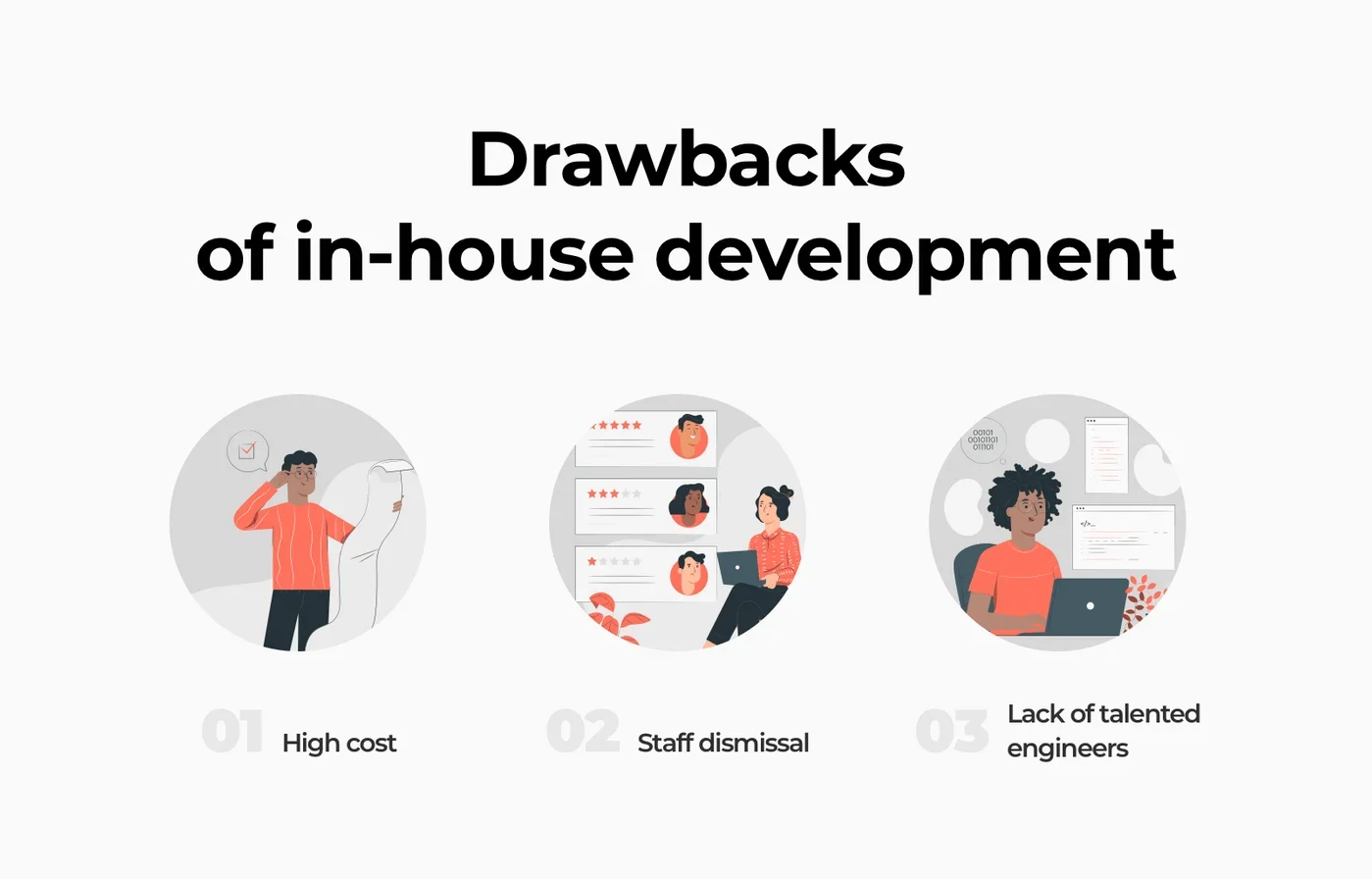
No one’s denying that there are tons of advantages to having an in-house development team. But there are also some cons.
A. Limited Access To Talent
You are often forced to draw from a small talent pool when creating an in-house software development team. A hybrid or on-site employment arrangement limits your hunt for resources in your immediate location. Software development is a fairly specialized sector that calls for a very specific set of skills, you can encounter a skill shortage.
If you don’t find the relevant skill set, you'll have to make do with less or give your staff more training. In either case, this will eventually hurt productivity and can be a harbinger of bad fortune for the company.
B. Costs
High costs are one of the major disadvantages of having an in-house development team. You’re responsible for training and managing the entire team. The salary of a full-time software developer in the USA is $74,210 on average.
We then have salaries to pay to UI/UX designers, front-end and back-end developers, QA resources, and the project manager. Not to mention the operating costs and running expenses involved in having an in-house team. All these can add up very quickly to the overall cost of the project.
C. Time Consuming
Development projects done in-house can take unexpectedly long. You might be spreading your workforce too thin, which could be one of the main causes. To get around this, they might have to put in extra hours to finish everything. And this vicious cycle will keep on adding to the project timeline. Outsourcing software development can save up employee bandwidth which can be put to good use in other important areas of your business.
What Is Outsourced Development?
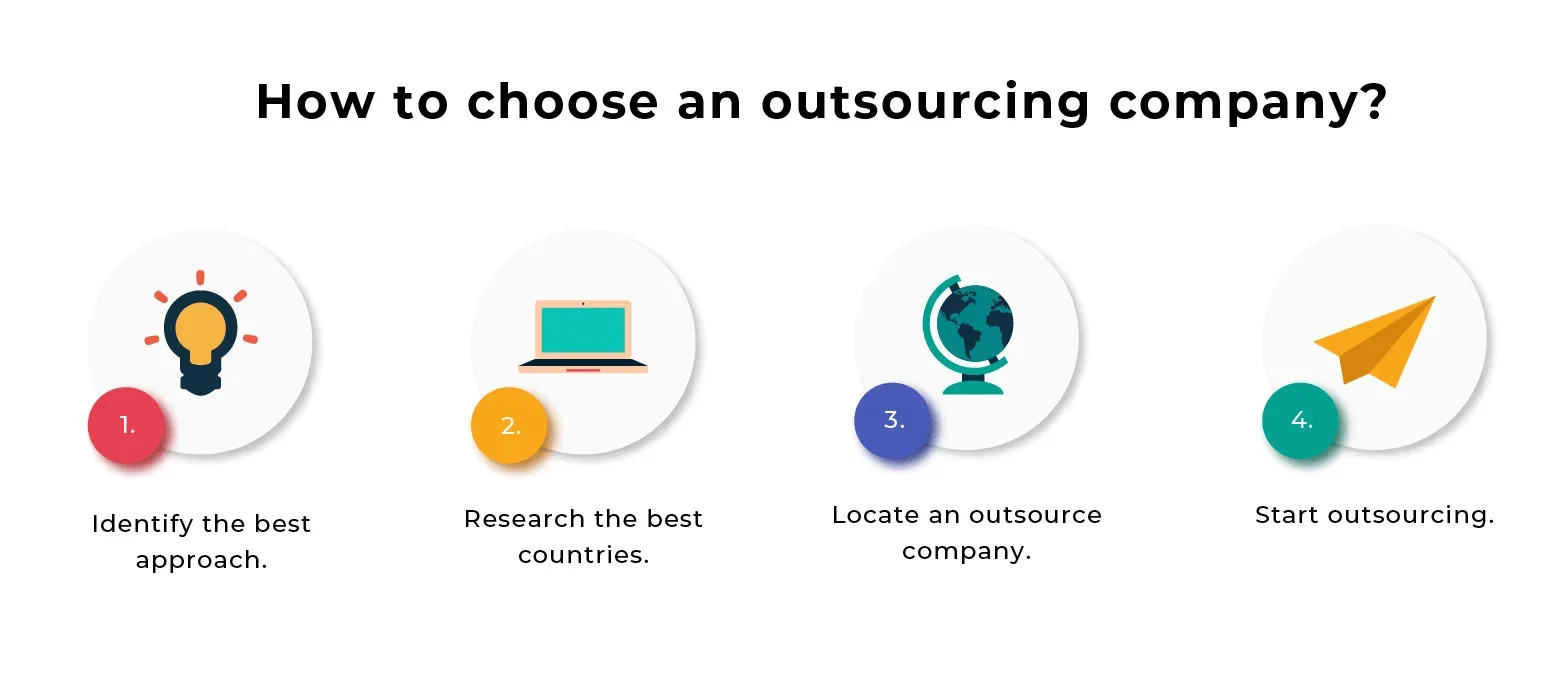
Let’s check out the other side of the coin. IT Outsourcing is when you hand over your development task to someone else, usually to an agency that is bound by a contractual agreement and a Non-Disclosure Agreement (NDA). This can entail either handing off the entire project to a software development outsourcing firm of your choice, or just certain tasks within the project.
Outsourcing is undeniably a growing market. In fact, it’s a $66.5 billion industry. Companies can choose to outsource for a myriad of different reasons. First, it’s a great way to develop high-quality software at scale with relatively low costs.
It supports keeping costs down while maintaining market competitiveness for both small and large-scale businesses. You can hire a skilled outsourcing agency like Aloa to do your development tasks.
We can step up our efforts to stay relevant in the digital age and make sure the project receives the most cutting-edge technological software solutions available because we have access to a global talent pool of developers that have been handpicked following a thorough vetting procedure. And since we don’t hire freelancers, you don’t have to worry about the unpredictability.
Many software development companies outsource their development projects. Even companies like Slack, Amazon, and Google have outsourced some of their development. Google is a behemoth in the tech industry with over 27,000 software engineers working for them. Yet, in some cases, Google still outsourced some of its development. Because in certain cases, it just makes sense.
Like in-house development, there are some advantages of outsourcing as well as some disadvantages. Let’s take a look at some of the most important ones.
Pros Of Outsourced Development
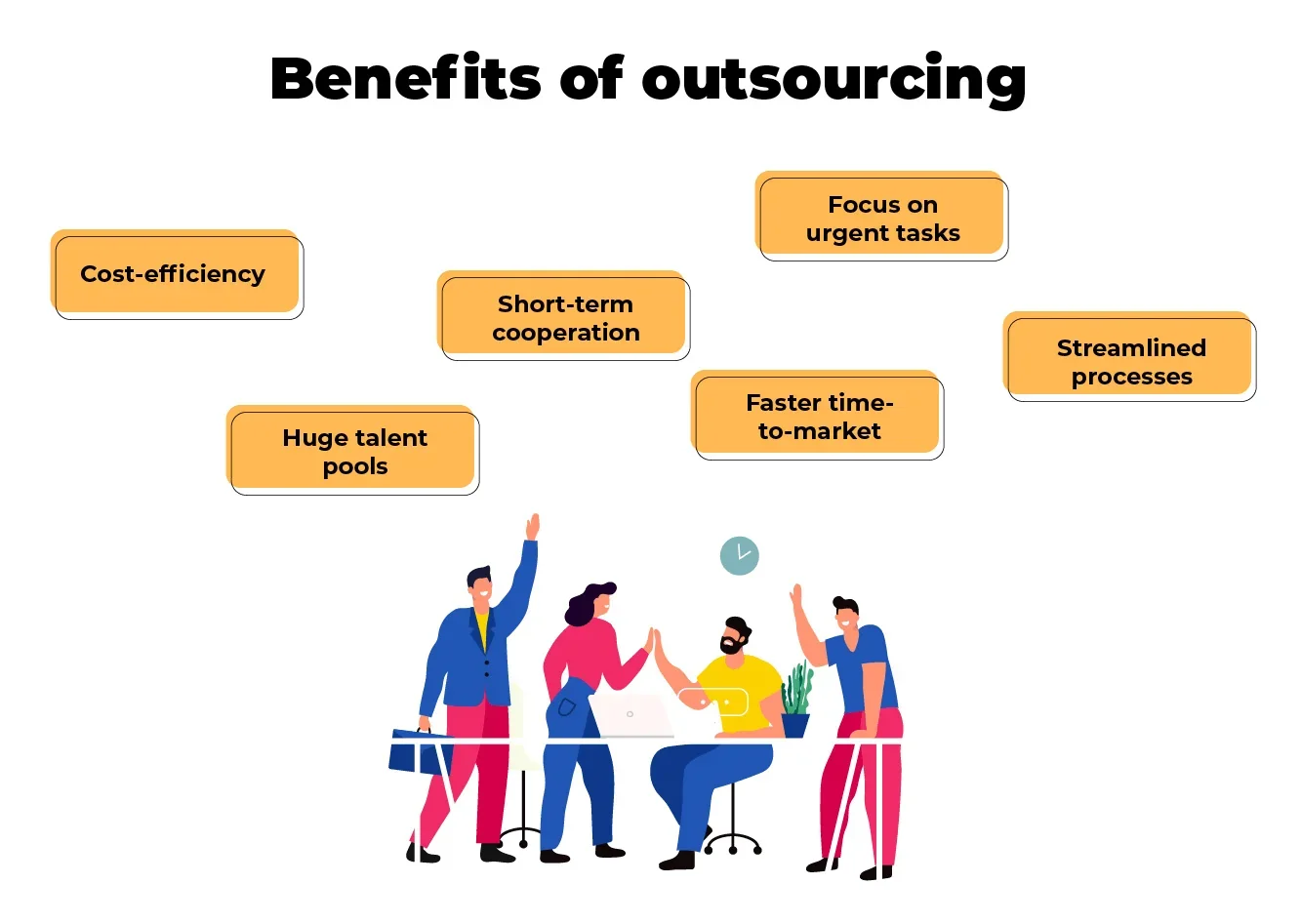
When outsourcing makes sense, it gives you the most scalability for your development projects. Here are some undeniable benefits of outsourcing.
i. Lower Costs
Opting for outsourcing service providers can give you a better ROI since you aren’t paying for the full-time salaries of the engineers that are working on the project.
If a company is based where wages for talent are high, those companies can outsource their development to more competitive markets. That’ll give you the option to choose between different agencies that promise you the best quality along with competitive pricing.
ii. Larger Pool Of Talent
You aren’t necessarily sacrificing quality when you outsource though. You might even get access to more talented people through outsourcing. Companies just aren’t restricted only to the talent of their in-house team.
With outsourcing, you can get to hire developers from India, Ukraine, Pakistan, the US, and other parts of the world which not only ensures diversity and increases inclusion but will also result in increased creativity. The likelihood of finding a practical solution to a developmental issue will increase because there will be more people with diverse viewpoints and solutions.
iii. Faster Turnaround
Outsourcing your development to an agency can increase your turnarounds and help you finish projects faster. That’s because your outsourcing partner will already have the people, infrastructure, and agency workflows in place to start working on the project right away.
On the other hand, your in-house team might need to be trained. And that can take time. While your team is training, the project hasn't even started. Outsourcing enables you to move to the next stages of product development faster and cuts your time to market down.
iv. Unrestricted Technology
Depending on the type and scale of a particular project, there might be a need for a diverse skill set or expertise in a specific niche. So it goes without saying that it’s hard to reliably find someone, let alone a team of people that are experts in everything.
Working with external partners and outsourcing gives you access to a diverse team with expertise in a host of different technologies and niches. The best outsourcing companies make it a point to have a diverse group of talented engineers.
v. Scalability
The great thing about good software is it scales. Well, at least it should. Similarly, your development needs to scale. Outsourcing gives you much more flexibility in scalability.
Your outsourcing partner can ramp up the scale of their team according to your needs. So requirement changes aren’t that much of a hassle. Whereas if you have an in-house team, scaling can be an issue.
If the requirement for a project increases, you’d need to hire new team members. And that means less time spent on recruiting and training. And you also certainly don’t want to fire the newly hired employees after the project is completed because there isn’t a need for the extra workforce. That’s going to be disastrous for your company's reputation.
Cons Of Outsourced Development
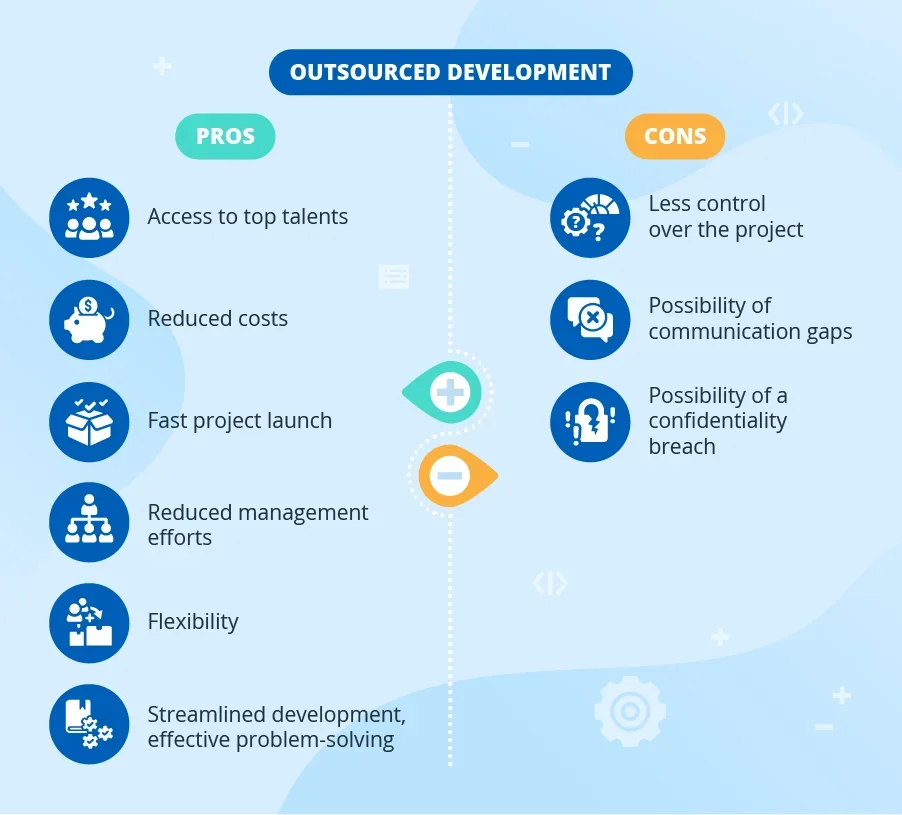
Outsourcing isn’t free from flaws, though. It has its own hiccups. Some disadvantages can be the deciding factor when choosing between in-house and outsourced development.
1. Lack Of Control
One of the biggest cons of outsourced development is a lack of control. In outsourced development, you aren’t working with your employees. You’re working with an agency and they’re dealing with the labor. This means you won’t get full control over things like troubleshooting, processes, and also the development itself.
2. Communication
Another hurdle in outsourced development can be ineffective communication. There can be two reasons for this. Your outsourcing partner might be based in a different country and different timezone. That introduces inherent language barriers. But honestly, that isn’t a major problem nowadays.
What’s a bigger concern is the time difference. When you’re outsourcing the development to an agency, there’ll be some inevitable back and forth. And with different time zones, this back and forth can take a long time to land on something productive and actionable.
In-House Development Vs. Outsourcing – The Winner

So which one wins? Well, the answer depends on your requirements and preference. There’s no clear winner here. But outsourcing is very lucrative for many companies in general. What’s best for you depends on your needs.
You need to identify priorities. And that’s the right approach when deciding between in-house software development and outsourced development. There are pros and cons for both. Is more control important to you than lowering costs? In that case, in-house development is the better option.
But high-quality and scalable development projects take time. If you want scalability, faster turnaround times, and lower development costs, outsourcing development makes more sense.
Which development strategy makes sense for you also depends on the size of your organization. Outsourced development is great for startups and SMBs. In such times, it can assist startups in minimizing their time to market and buffering demand shocks.
The type of project can also be a deciding factor. If the project is complex and needs a lot of technical expertise in a particular niche, you might be better off outsourcing it to a reliable partner.
And no one said you have to choose one or the other for software or mobile app development. It doesn’t have to be a one-way deal. Companies can use staff augmentation to balance productivity, talent, and costs for their development projects.
Staff augmentation strategy allows businesses to temporarily work with an external workforce for a project along with their in-house teams. This is a hybrid model of work where work is divided between the two teams. The outsourced team reinforces your existing team by working on one part of the project while the in-house team can work on the other.
For most companies, outsourcing is the clear winner since the benefits far outweigh the disadvantages. It is cost-effective and you also get access to a larger pool of talent.
Factors To Consider When Choosing Between In-House Development And Outsourcing
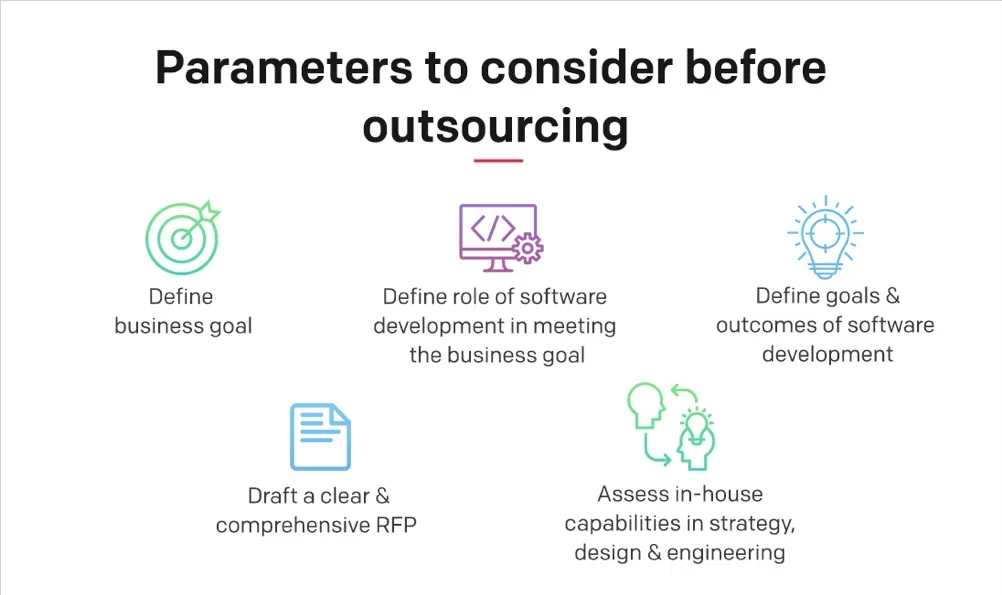
There are solid factors to consider when choosing between in-house development and outsourcing. Keeping these factors in mind will make the decision easier for you.
Factor 1: Do You Have The Right Team
You need to see whether you already have the right team for a particular development project or not. This gives you a good idea about whether it’s possible to finish the project in-house. But you’ll also need to think about the skill set of the engineers. That isn’t to say that your current engineers are bad. But the project might require expertise in a niche. And training your employees can take time.
Factor 2: Project Requirements
You need to understand the project requirements and their nuances. Define the scope and specific requirements of the project early on. If it’s a large project that’ll need dedicated resources for a long period, in-house development could be the right choice.
But if it’s a one-off project, then outsourcing could be the right call. Your employees can then work on core projects that are relatively more important for your company’s mission.
Factor 3: Budget
Every development project will have some definite cost differences between in-house and outsourced development.
How much budget do you have for the project? Would a full-time employee, or a team of full-time employees fit in that budget? Knowing the answers to these questions is important. But understand that outsourcing doesn't always guarantee low cost.
Outsourcing saves you initial costs like recruiting, salary and training. But agencies charge fees. Some agencies may charge more, especially if you want quality work. Even though it will always be more cost effective than having an in-house team, if you need to work with an outsourcing company for a long period, the costs can add up over time. So budget accordingly.
Factor 4: Company Culture Fit
Every company has its own culture and philosophy. The way you develop and think about culture and the way software should work may differ from an agency’s perspective. Differences in culture and the work development process can hamper effective development. That’s why cultural fit is an important consideration.
Factor 5: Control Level
When choosing between in-house development and outsourced development, how much control you want can sway the decision. You might need complete control over a critical development project and that face-to-face communication. In that case, in-house development would be better.
Factor 6: Security
Security is a concern for development companies. You don’t have to worry that much about security with an in-house team. But the back and forth and sharing of sensitive data when outsourcing development might open you up to security vulnerabilities.
Having said that, when companies outsource their development project, they go through a vigorous vetting process to ensure safety and quality. Partnering up with a reliable and reputed outsourcing company won’t be a problem.
Conclusion
There you have it. Now you should have a complete understanding of in-house development vs outsourcing. The right decision is the decision that works best for your specific business need. At the end of the day, opting for in-house or outsourced development are just two different ways of getting something done.
The thing to look out for here is which way suits your current situation and goals. That’s why understanding your goal, strengths and weaknesses are important. You can’t ignore the project requirement itself.
Understand what the project requires and what’ll be the long-term impact of the project. All these factors will help you decide between in-house and outsourced development.
Check out Aloa if you’re looking for an expert development service provider. Our software development team does all the heavy lifting for you. You get the best of both worlds - scalability along with the reliability of an in-house team. You can visit our website or contact us at resources@aloa.co to know more.

